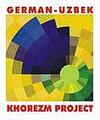Opening of the new ZEF Khorezm Project Building at the University of Urgench on May 28 2003

On May 28 2003, a new office and laboratories for the Uzbekistan-Project of the Center for Development Research (ZEF) of the University of Bonn were officially inaugurated by both the German Ambassador to Uzbekistan, Dr. Martin Hecker, and the Deputy Hakim (Governor) of the Khorezm Province, Mr. Ollabergan Ollaberganov. The project, entitled “Ecological and Economic Restructuring of Land- and Water Use in the Region of Khorezm”, is being carried out by ZEF in cooperation with UNESCO.
About 70 visitors from Tashkent, Urgench and Germany attended the inauguration. The new 680-square-meter building offers laboratory and office space as well as teaching facilities for about 20-30 scientists. At present, all laboratories have been installed and equipped with modern facilities - yet at the same time the building maintains a traditional architectural vista. The State University of Urgench (UrSU) in Khorezm provided the project with an old office that was totally refurbished and extended by the project with financial support from the German Federal Ministry for Education and Research (BMBF) and the Center for Development Research (ZEF) in Bonn.
The ZEF/UNESCO project in Urgench started in 2002 and is based on the hypothesis that, far from being of purely agricultural nature, the complex situation in the Aral Sea Basin is also is a result of economic policy and administrative measures and therefore can only be handled by a truly interdisciplinary approach. Hence, the ZEF/UNESCO project integrates three large disciplinary domains: Ecology, Economics, and Social Science.
The intended promotion of sustainable land and water use is a long-term endeavor and, due to the multi-disciplinary nature of the problem, must have a strong scientific basis. This can be reached only by an increased knowledge about the environment and about the consequences of an improved use of the natural water and soil resources. Also, the knowledge must be passed from international experts to regional specialists, since countries in Central Asia urgently need a stock of young, westerly-trained scientists to increase their capacities to cope with the upcoming development problems. Therefore, besides the elaboration of development options for the Aral Sea Basin, additional key objectives of the program are to build up a strong scientific cooperation, and to invest strongly in human capacity building for young scientists in Khorezm.
In its first year already, the ZEF project is accommodating ten Uzbek and three European Ph.D. students, most at ZEF’s Doctoral program in Bonn, others at renowned Uzbek universities in Tashkent. A few Master students have been accepted by ARTS, a Masters Program at the University of Bonn ("Agricultural Science and Resource Management in the Tropics and Subtropics").
In the near future, a UNESCO-funded virtual lab at UrSU will be established allowing long-distance teaching, as well as a direct link to other research groups dealing with large terminal lakes such as the Dead Sea and Lake Tchad. Local scientists from Tashkent and Urgench State University, can thus, hand-in-hand with their German counterparts and foreign colleagues, make a valuable contribution towards strengthening environmental research capacities, which is a imperative if Uzbekistan is to master the situation by itself and to change the living conditions of the affected people for the better.



